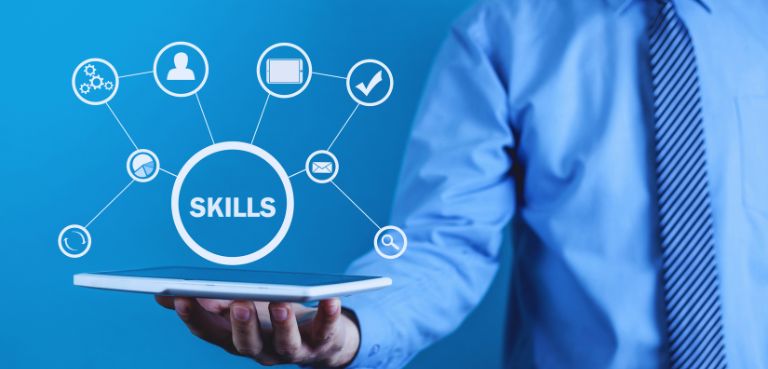Learning isn’t just something you do. It’s something you get better at—if you know how. Most people never think about that. They just try to learn new things and hope it works. But here’s the truth: learning is a set of skills. It’s not just about memory. Or being smart. Or reading faster. If you’ve ever asked yourself, what are the skills of learning?, the answer is simple: they’re tools. Tools that help your brain take in new stuff, make sense of it, and actually keep it.
Nobody really teaches this. Not in school or at uni. Not even in most jobs. You’re just meant to figure it out as you go. And that’s a bit mad, isn’t it? Because the better your learning skills, the easier everything gets. Work, study, career moves, life goals—they all get easier when your learning toolbox is sharp.
Let’s talk about that toolbox. What goes in it? How to use it. And how to build it from wherever you are right now.

Focus: The Starting Point for Every Other Learning Skill
You can’t learn if your brain’s all over the place. Focus isn’t just about trying harder. It’s about building a space where your mind can stay with something long enough to get it.
Phones make this harder. So do endless tabs. You don’t need to become a monk. You just need some structure. Start with ten minutes of real, full attention. Then work your way up. Use a timer if it helps. When your focus gets stronger, learning feels smoother.
You’ll start to feel less tired too. Because switching between tasks over and over wears you out.
Asking Questions: The Skill That Turns Average Learners Into Great Ones
If you only remember one thing from this post, let it be this: better questions lead to better learning.
Don’t just ask, “What is this?” Ask, “How does this work?” or “Why does it matter?” or even, “What happens if I change this?” You’ll see more layers. You’ll remember more. And you’ll stop getting stuck at surface level.
Kids ask questions nonstop. Somewhere along the way, adults stop doing that. Bring it back. Curiosity makes your brain light up.
Reflection: Learning Doesn’t Stick Without It
Most people move on too fast. They finish a chapter or watch a video, then jump to the next thing. But without reflection, most of it disappears.
Reflection doesn’t need to be deep. Just pause and ask, “What did I just learn?” or “What felt new or odd?” or “What still doesn’t make sense?” A five-minute check-in helps more than cramming twice as long.
You can write it down. Or talk it out. Or even think it through while making a cup of tea. But do it. It makes a huge difference.
Self-Awareness: Knowing How You Learn Best
Not everyone learns the same way. Some people love writing notes. Others remember more when they explain things out loud. Some need silence. Others work a little better with a bit of background noise.
Try different things. Notice what works. Pay attention to how you feel when you study. If your brain shuts down after 20 minutes, take shorter blocks. If you lose track of time while teaching something, do more of that.
Knowing your style makes you faster. It saves time. And it saves stress.
Memory Tricks: Use What Your Brain Likes
You don’t need a perfect memory. You just need to make your brain’s job easier. That means giving it stuff it likes.
Repeat things—but space it out. Go over something today. Again in two days. Then a week later. That pattern helps it stick. Say things out loud. Make silly connections. Draw it. Move while you talk. The more senses you use, the better your brain grabs it.
And no, re-reading the same notes five times isn’t learning. It just feels like progress. You need to do something with the info.
Thinking About Thinking (Yeah, Really)
This one sounds deep, but stay with me. It’s called metacognition. All it means is thinking about how your brain is working while you learn.
Notice when something clicks. Notice when your brain drifts. If something keeps confusing you, stop and figure out why. Maybe you missed a piece. Maybe it’s not clear yet. That’s fine. The key is to notice it.
Smart learners don’t push through confusion. They pause. They adjust. Then they go back in stronger.
Confidence: A Skill? Yes, and It Matters More Than You Think
Lots of people say, “I’m just not good at learning.” But that’s often not true. They just haven’t had wins yet. Confidence comes from proof. Every time you learn something new, that’s proof. So celebrate it even if it’s small especially if it’s small. Every win is a step. The more you see yourself learning, the more you believe you can learn. And that belief fuels more effort. It’s a good loop.
Patience: The Most Underrated Learning Skill
Some stuff takes time. It just does. You can’t rush it. And when you try, you often learn it worse. If something’s hard, that’s not a red flag. That’s a sign you’re growing. Real learning often feels uncomfortable. That weird feeling? It means your brain is stretching. Don’t walk away when it feels awkward. Stick with it. Ask questions. Break it into chunks. Come back tomorrow. Your brain keeps working on it even when you’re not looking.
The Social Side: Learning Doesn’t Happen Alone
Talking things through helps. Teaching someone else helps more. Asking someone to explain it to you helps, too.
Learning doesn’t have to be quiet. Study groups work. Quick chats work. Even arguing about ideas helps lock them in. And you’ll get new angles too. Other people see things you don’t. That perspective makes your learning deeper.
Dealing With Distractions: You’ll Never Eliminate Them, So Learn to Work With Them
You don’t need perfect silence. Or a perfect desk. Or the perfect mood. You just need a few tools to handle real life.
Try background music if you’re restless. Or set a five-minute timer to just start—then decide if you want to keep going. Often, starting is the hardest bit. And forgive yourself when your brain wanders. Just notice it, bring it back, and keep going.
Organisation: Your Brain Can’t Juggle Everything at Once
Keep your learning stuff in one place. A notebook, a folder, a notes app—whatever works. Don’t try to remember everything. Use lists. Use calendars. Make space in your brain for the thinking, not the juggling. When you can find things quickly, you waste less time. That keeps momentum going. Momentum feels good.
Mindset: The One Thing That Pulls All the Other Skills Together
This might be the most important piece. You have to believe learning is something you can get better at. Not something you’re born good at. Something you build. That shift changes how you approach everything. Instead of thinking, “I failed,” you begin to say, “I’m still learning.” Rather than avoiding hard stuff, you lean into it.
Mindset turns frustration into progress.
So—What Are the Skills of Learning? Let’s Wrap It Up
Let’s bring it back. If someone asks you, “What are the skills of learning?”—you can now give a real answer. They’re tools. Focus, questioning, reflection. Self-awareness. Memory tricks. Patience. Confidence. Mindset. And more. You don’t need all of them at once. You don’t need to master them overnight. But knowing they exist already puts you ahead. Most people try to learn with no map. You’ve got one now.
The next step? Try one or two of these skills today. Pick something small. Give it a go. Reflect on what worked. That’s it. Keep building your learning toolbox. You’ll be shocked how far it takes you.
Build real learning skills that stick. Enrol in our online Personal Development courses at School of Health Care and sharpen your toolbox today.



